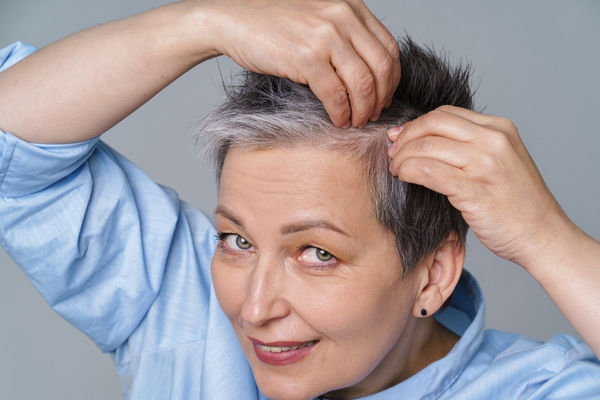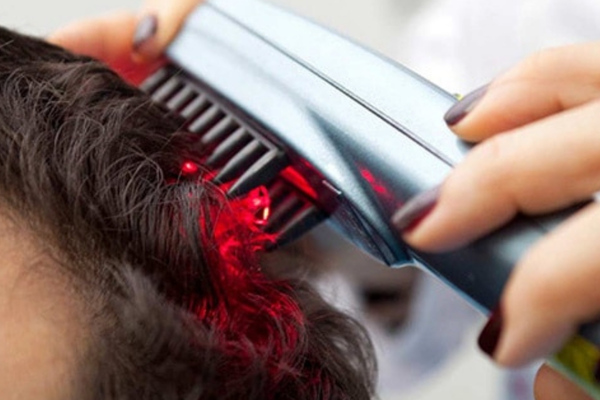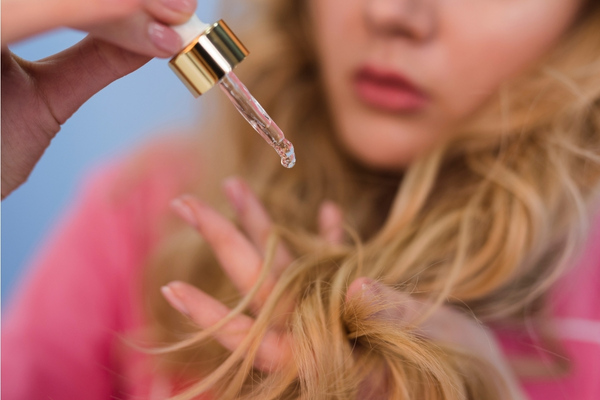Effective Medical Treatments for Grey Hair
Mar 24, 2023 | By Queenie

We all know that grey hair is a common part of the natural aging process.
But did you know that there are some medical treatments that can help slow down or even reverse the greying process? It's true!
While there is no known cure for grey hair, there are some interventions that have shown promise in restoring natural hair color.

Grey hair occurs when the body produces less melanin, the pigment that gives hair its color. But there are other factors at play too, like genetics, stress, and illness.
For some people, premature grey hair can also be a concern. It can be tough on self-esteem to feel like you're aging too quickly or look older than your actual age due to your hair color.
In this article, we will discuss:
- The Effect Biotin Supplements for Grey Hair
- The Role of Catalase in Reversing Gray Hair
- Prescription and Medications for Grey Hair
- The Effectiveness of Laser Therapy for Grey Hair
- Essential Oils to Treat Greying Hair
- Natural Treatment for Gray Hairs
Read on!
The Effectiveness of Biotin Supplements for Grey Hair

Biotin, also known as vitamin B7 or vitamin H. This water-soluble vitamin plays a crucial role in producing keratin, the protein that makes up the structure of our hair. With stronger hair strands and improved hair growth, biotin has been found to potentially reverse premature greying of hair.
Research has shown that individuals with low levels of biotin in their blood are more likely to experience premature greying of hair.
But before you start loading up on biotin supplements, it's important to check with your healthcare provider.
Different people have different needs and tolerances, and biotin supplements may interact with certain medications. And remember, potential side effects can include skin rash and digestive issues.
Overall, biotin can be a great addition to your hair health routine, but make sure to do your due diligence and consult with a professional before starting any supplement regimen.
The Role of Catalase in Reversing Gray Hair

Did you know that the graying of hair can be caused by the accumulation of harmful byproducts of cellular metabolism in hair follicles? This is where catalase, an antioxidant enzyme, comes in.
Catalase breaks down these byproducts, such as hydrogen peroxide, which can damage melanin-producing pigment cells and lead to the graying process.
Research has suggested a link between low catalase levels and the development of grey hair, particularly as individuals age and their bodies produce less catalase.
To address this issue, researchers have explored the use of catalase supplements or topical treatments to potentially reverse grey hair strand by increasing the levels of catalase in the body.
While new research is still in its early stages, some studies have shown promising results.
Participants who took a daily oral supplement containing catalase and other vitamins and minerals experienced a significant reduction in grey strands after several months of use.
Remember, it's always important to speak with your healthcare provider before starting any new supplement or topical treatment regimen. They can help determine if these products are right for you and recommend a safe and effective dosage.
Prescription Medications for Grey Hair

Silver strands are a common issue that affects many people as they age.
While natural remedies are available, some people prefer prescription medications for a more robust approach.
Here's an overview of some of the prescription medications currently used to treat grey hair:
Minoxidil
Originally developed as a treatment for hair loss, minoxidil is now used in some cases to treat and prevent grey hair. The medication works by increasing blood flow to hair follicles and stimulating the production of melanin, the pigment that gives hair its color. Minoxidil is typically applied topically to the scalp, and results may take several months to appear.
Melatonin
While most commonly known as a sleep aid, melatonin has also been studied for its potential to improve hair pigmentation. Melatonin is a hormone that regulates the body's circadian rhythm, and it is also a powerful antioxidant that can help protect hair cells from damage. Melatonin supplements or topical treatments may help stimulate the production of melanin in hair follicles.
Bimatoprost
Bimatoprost is originally developed as a treatment for glaucoma. It has also been studied for its potential to stimulate hair growth and improve hair pigmentation. The medication works by increasing blood flow to hair follicles and stimulating the production of melanin. Bimatoprost is typically applied topically to the scalp, and some studies have shown promising results in improving hair development and reducing grey hair.
The Effectiveness of Laser Therapy for Grey Hair

Low-level laser therapy (LLLT) is a non-invasive laser treatment for hair loss and thinning. LLLT works by exposing the scalp to low levels of red or near-infrared light, which stimulates cellular activity, leading to improved circulation and the production of ATP.
LLLT has shown promising results in reversing grey hair, with studies showing a significant reduction in grey hairs and an improvement in hair density and thickness. The mechanism by which LLLT improves hair pigmentation is thought to be related to increased circulation and melanin production in hair follicles.
However, potential side effects and interactions with medications should be considered before starting LLLT, and it is important to consult with a healthcare provider beforehand.
How to Use Essential Oils to Treat Greying Hair

Did you know that essential oils can work wonders for your hair health?
Essential oils are concentrated extracts from plants that are widely used in aromatherapy and natural medicine. These oils have been shown to have a variety of benefits for hair health, including strengthening hair strands, promoting hair growth, and improving scalp health.
Certain essential oils may also help to reverse grey hair by stimulating the production of melanin in hair follicles. Melanin is the pigment that gives hair its color, and as we age, the production of melanin naturally decreases, leading to the development of grey hair.
Some of the essential oils that may be effective for treating grey hair include:
Rosemary oil
This oil is known for its ability to improve circulation and stimulate hair development. It may also help to darken hair by increasing melanin production.
Sage oil
Sage oil has been shown to increase melanin production and improve hair pigmentation. It may also help to strengthen hair strands and promote hair growth.
Lavender oil
Lavender oil is known for its calming and relaxing properties, but it may also help to improve hair health. It has been shown to stimulate hair development and improve scalp health, which can contribute to healthy hair pigmentation.
To use essential oils for greying hair treatment, there are several recommended methods:
- Dilute the essential oil with a carrier oil, such as coconut oil, castor oil, or jojoba oil, and apply it directly to the scalp. Massage the oil into the scalp for several minutes, then leave it on for at least an hour before washing it out with shampoo.
- Make a hair mask by mixing the essential oil with carrier oil and egg yolk. Apply the mixture to your hair and leave it on for at least 30 minutes before washing it out with shampoo.
When using essential oils for grey hair treatment, it is important to be aware of potential side effects and considerations. Essential oils are highly concentrated and can cause skin irritation or allergic reactions in some individuals.
It is recommended to do a patch test before using any new essential oil and to consult with a healthcare provider if you have any concerns or underlying medical conditions.
Natural Treatment for Gray Hairs

Are you tired of dealing with grey hair and covering it up with hair dyes? Or maybe medical treatments don't work best for you. But there's no need to worry! Natural treatments are worth exploring, as they are generally safer and less likely to cause adverse reactions. Not to mention, they often contain natural ingredients that provide a range of benefits for hair health.
While medical treatments such as prescription medications and low-level laser therapy (LLLT) can be effective for some people, they also carry potential side effects and may not be suitable for everyone.
Natural treatments, on the other hand, are generally considered safer and less likely to cause adverse reactions. They also often contain natural ingredients that provide a range of benefits for hair health, beyond just treating grey hair.
If you're looking for a natural gray hair treatment that works wonders, Mayraki's Anti Grey Restoring Treatment is a great option to consider. This product contains natural ingredients such as Polygonum Multiflorum Extract (Fo-Ti) and Coffee Arabica Extract, which have been shown to improve hair pigmentation and overall hair health.
Overall, natural treatments can be a safe and effective option for treating grey hair. This natural grey hair treatment from Mayraki is one natural product that may be worth exploring for those looking for a natural alternative to medical interventions turn grey out.
Conclusion
In conclusion, there are several medical treatments available for treating grey hair, including prescription medications, low-level laser therapy (LLLT), and supplements.
Minoxidil and finasteride are two commonly used medications that have been shown to be effective in some cases for reversing grey hair.
LLLT is another treatment option that involves exposing the scalp to low levels of red or near-infrared light, which can stimulate hair growth and improve hair health.
While medical treatments can be effective for some people, it is important to consider the potential risks and benefits before starting any treatment.
Natural alternative products may also be worth exploring which contain safe and natural ingredients like Polygonum Multiflorum Extract and Coffee Arabica Extract. Ultimately, the best approach to treating grey hair will depend on your unique situation and goals, and working with a healthcare professional can help ensure the most effective and safe treatment plan.




